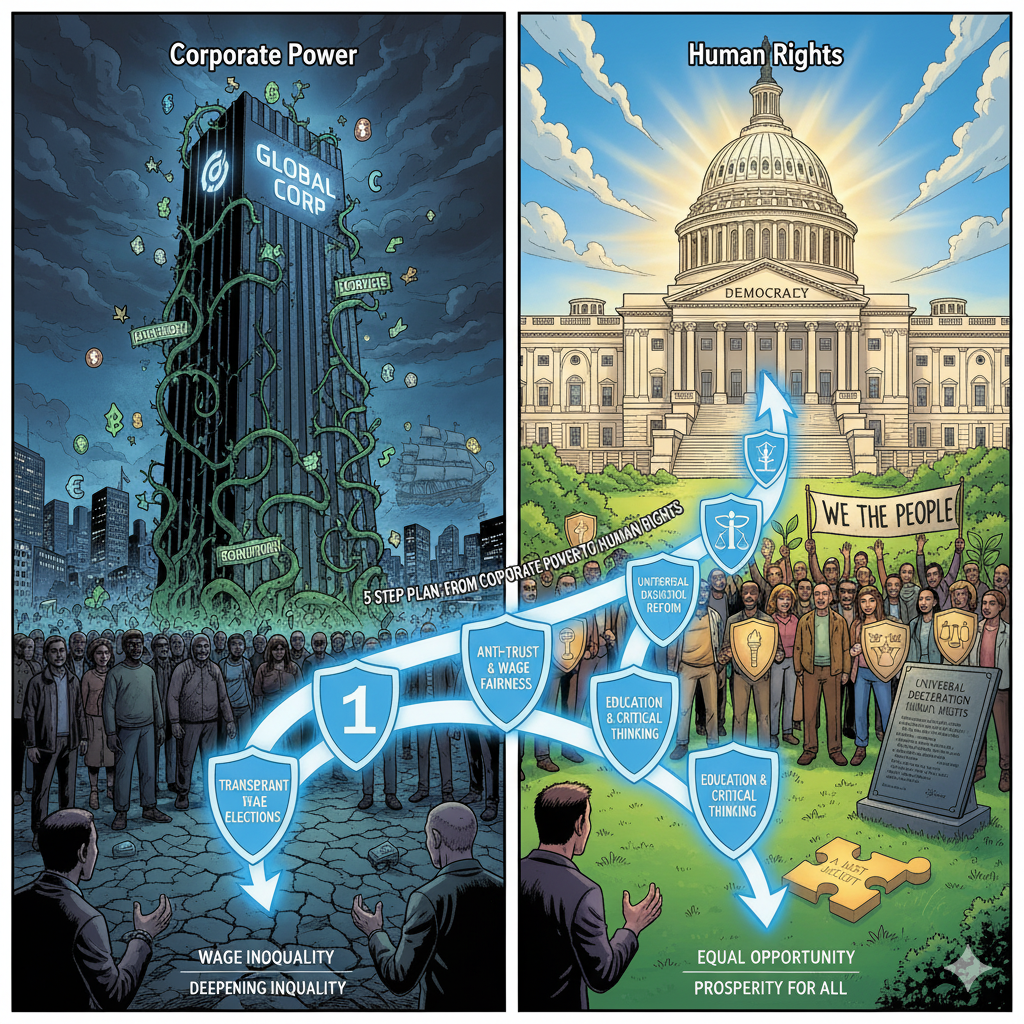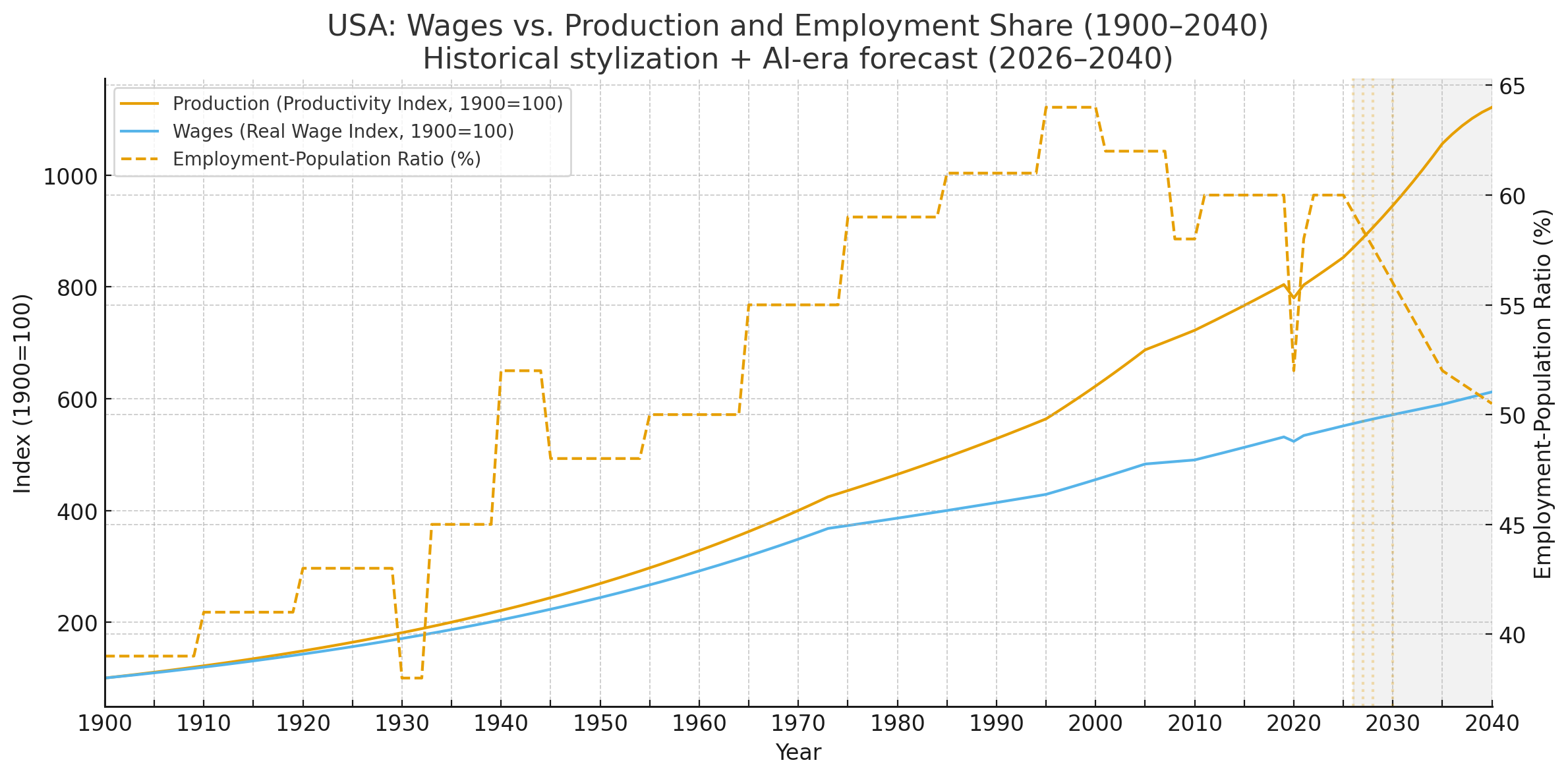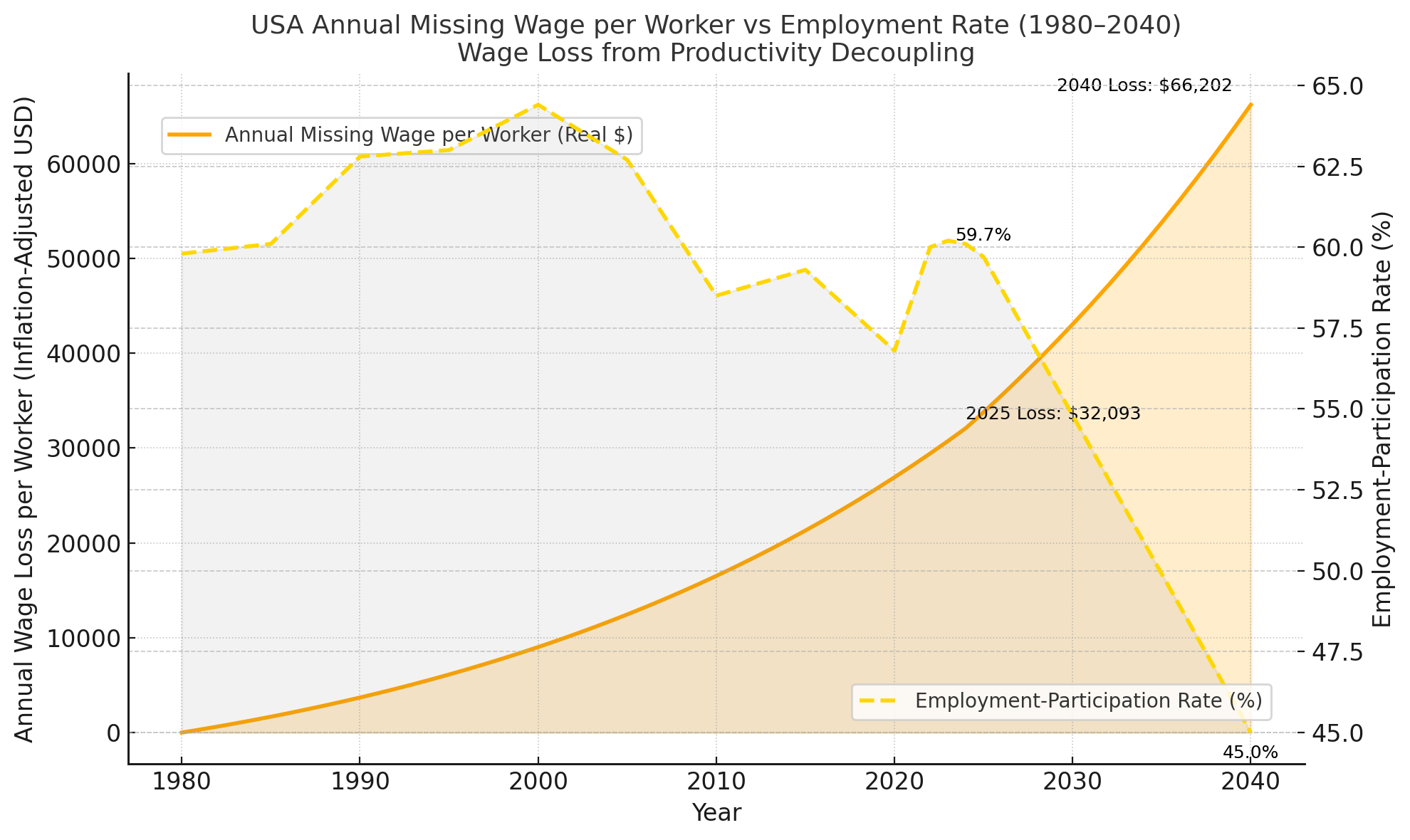5 Step Plan to the New USA
"From the shadows of corporate dominance to the light of genuine democracy: 5 essential steps—Transparent Elections, Anti-Trust & Wage Fairness, Constitutional Reform, Education & Critical Thinking, and Universal Human Rights—to empower 'We the People'."

Democracy, Justice, and the Foundations of a Fair Society
Historical Origins: The Founding Vision
The Boston Tea Party was carried out by self-employed colonists and small business people revolting against a backroom deal the King gave to the largest international corporation of that time: the East India Trading Company. When the American colonies declared independence from England in 1776, they were freeing themselves not just from a distant monarch, but from the control of English corporations that held monopolies and extracted wealth from the colonies.
The colonists were forced to sell their products only to Britain and buy manufactured goods at inflated British prices. The British Navigation Acts, which required colonial trade to flow through British ports and on British ships, served only to enrich British merchants at American expense.
The Founders' Warnings About Corporate Power
The Founding Fathers had a cautious view of corporate power and initially limited corporations primarily to a business role, with restrictions on their influence in politics or charitable activities. Early corporations in America included cities, schools, and charitable organizations, with economic enterprises chartered as corporations appearing more in the 1790s.
The Founding Fathers worried that corporations could:
- Become too powerful: They feared corporations would gain too much economic and political control, like the East India Company had in the colonies.
- Corrupt the government: They were concerned that wealthy corporations could influence elections and laws for their own benefit.
- Undermine democracy: They believed this power could threaten the government's ability to act on behalf of the people.
Therefore, early corporations in the US were closely controlled by the government and focused on serving the public, not just making profits.
America was founded on what John Adams called the Moral Algorithm: government exists for the common good, not for the profit of any one man or class. The Founders knew corporate power could corrupt government, crush democracy, and undermine the people's prosperity, so they kept corporations tightly controlled and bound to serve the public.
Today, those warnings have been forgotten. Corporate power is no longer restrained—it rules. And that rule is at the root of America's collapse.
The Nature of Society and Government
Society is produced by human wants and government by human wickedness. Society promotes happiness positively by uniting affections, while government restrains vice negatively through punishment. Society arises from human wants, while government exists to restrain vices.
Government's origin lies in humanity's fall from natural innocence. In the earliest times, moral virtue alone governed human conduct. As vice entered the world, government became necessary to provide security that virtue alone could not guarantee.
No one chooses the circumstances they're born into, yet those circumstances shape everything: opportunity, freedom, even the belief that progress is possible. People are born in a state of inequality and in a society where justice rules, it is the government's job to provide an environment of equality and constrain the vices of those people to ensure that every individual provides one more step forward in mankind's progress.
In a just society, it is not the role of government to reward the fortunate or punish the broken. It is to build the scaffolding of fairness, to dismantle the barriers that chain potential, and to design systems that unlock the promise within each human life.
The Rule of Law
Thomas Paine argued that "as in absolute governments the King is law, so in free countries the law ought to be King; and there ought to be no other." This meant that in America, no person—regardless of position, wealth, or influence—would stand above established law.
America's Diversity as Strength
Thomas Paine emphasized America's religious and ethnic diversity as a strength rather than weakness, arguing that people from many nations have found refuge in America from European oppression. This diversity creates natural bonds with all of Europe while preventing domination by any single European power. America's mixed population gives it connections throughout the world while maintaining independence from the prejudices and conflicts of the Old World.
Justice, Equality, and Opportunity
Individuals are born into unequal circumstances shaped by genetic, socioeconomic, environmental, and cultural factors, resulting in disparate opportunities. In a society committed to justice and fairness, the government bears the primary responsibility to create an environment of equal opportunity. This involves dismantling systemic barriers and addressing harmful patterns—such as exploitation, discrimination, or the concentration of opportunities—that perpetuate inequality, thereby enabling every person to contribute to collective progress.
A just society begins when everyone knows the rules, shares in the rewards, and trusts that the game is fair. That's how we build dignity, cooperation, and peace—not by forcing people to obey, but by giving them something worth believing in.
A stable society works when the rules are clear, the rewards are real, and the game feels fair. This isn't weakness; it's what makes strength last. A civilization doesn't fall when it gets poor, or diverse, or even chaotic. It falls when no one believes the game is worth playing.
Progress and Human Development
Progress is not an accident. It is the deliberate, generational expansion of human capability—our power to solve problems, uplift one another, and shape a better future. Progress is defined as the sustainable enhancement of human capabilities, problem-solving capacity, and overall well-being across generations.
But progress only happens when we confront the forces that hold us back: exploitation, discrimination, and the hoarding of opportunity. These are not merely moral failures; they are structural vices, patterns that rot the foundation of a thriving civilization.
Harmful patterns, or vices, refer to entrenched behaviors and structures that limit opportunities, exploit future potential, or hinder others' development. Vices are systemic behaviors that concentrate opportunity, exploit future potential, or suppress others' development. The government must optimize these patterns structurally, not judge them morally, to unlock each person's contribution to collective advancement.
The true task of government is not to pass judgment, but to rewire the system, to constrain the vices, amplify the virtues, and ensure that every person can stand on equal ground and move us all one step forward in the story of humankind.
The Erosion of American Prosperity
Wage Stagnation and Economic Inequality
If wages had grown with productivity since 1980, the average American worker would earn about $25,000 more per year. This disconnect between productivity and compensation represents one of the fundamental failures of the modern economic system.
Pay attention to the dotted line which is Job participation and what happens after today!


The Dismantling of Middle-Class Protections
For the last 50 years, the Republican Party has been systematically undoing the very policies that built America's middle class:
- Franklin D. Roosevelt created the New Deal—Social Security, banking regulations, labor protections, and public works programs that lifted millions out of poverty and built the foundation of the middle class; Republicans have spent decades deregulating Wall Street, weakening Social Security, dismantling Glass-Steagall and other financial safeguards, and attacking the very programs that created broadly shared prosperity.
- Theodore Roosevelt cracked down on monopolies and corporate greed; Republicans tore those antitrust protections apart.
- Truman fought for labor rights and fair wages; Republicans weakened unions and handed power back to corporations.
- Lyndon B. Johnson created Medicare, Medicaid, and the Great Society to give working Americans a fair shot; Republicans have spent decades trying to privatize, defund, and gut those safety nets.
From union-busting, to starving public schools, to slashing taxes for the wealthy while ballooning the deficit, the GOP has dismantled every safeguard that once kept greed in check and prosperity within reach.
The result? A rigged corporate capitalist system where the top 1% hoard everything and the bottom 90% are told to fight over scraps.
Enemies from Within: Threats to Democratic Discourse
Demagogic Manipulation
Demagogic tools evoke fear or resentment, draw sharp divisions, undermine trust in norms and institutions, amplify misinformation, and appeal to identity, sometimes with little concern for nuance or truth.
These tools are effective but dangerous. They erode democratic discourse, degrade public trust, and create conditions ripe for authoritarianism. Ethical governance relies on truth, reason, fairness, and accountability—all of which are undermined by demagogic manipulation.
Abraham Lincoln warned: "We the people are the rightful masters of both Congress and the courts, not to overthrow the Constitution but to overthrow the men who pervert the Constitution."
Education and Critical Thinking
The Trivium Framework
The trivium framework addresses the corruption risks inherent in pure rhetoric training. By grounding persuasive communication in factual accuracy (Grammar) and logical consistency (Logic), the model prevents the development of manipulative communication skills that lack ethical foundation.
| Question | Trivium Stage | Function |
|---|---|---|
| Who / What? | Grammar | Identify elements |
| How? | Logic | Understand processes |
| Why? | Logic | Derive meaning |
| Where / When? | Grammar | Contextualize data |
| To whom / for what purpose? | Rhetoric | Determine ethical application |
The Trivium Spiral is the operating system of learning. It turns curiosity into mastery, knowledge into wisdom, and communication into civilization. Each loop through the spiral refines perception, understanding, and moral action.
"Education is not the filling of a pail, but the lighting of a fire."
— William Butler Yeats
Principles for Constructive Discourse
- One issue at a time. Park tangents.
- Define terms. No progress without shared meanings.
- Assign the burden of proof to whoever makes the claim.
- Steelman first: restate their best version; ask them to confirm.
- Show evidence and its source quality; argue claims, not people.
- Test logic (cause vs. correlation, general vs. anecdote).
Conclusion: The Path Forward
The government's role is to mitigate systemic inequalities structurally, while navigating diverse philosophical perspectives, to foster an inclusive society where each individual's potential advances humanity's shared goals. This requires:
- Protection of democratic norms against demagogic manipulation
- Structural reform to constrain corporate power and restore democratic accountability
- Educational excellence that develops critical thinking and ethical reasoning
- Economic justice that reconnects wages with productivity and opportunity with effort
- Equal opportunity as the foundation of social mobility and collective progress
A just society is not built on perfection but on commitment—to fairness, to truth, to the belief that every person deserves a chance to contribute to our shared future. When we uphold these principles, we don't just preserve democracy; we fulfill its promise.
